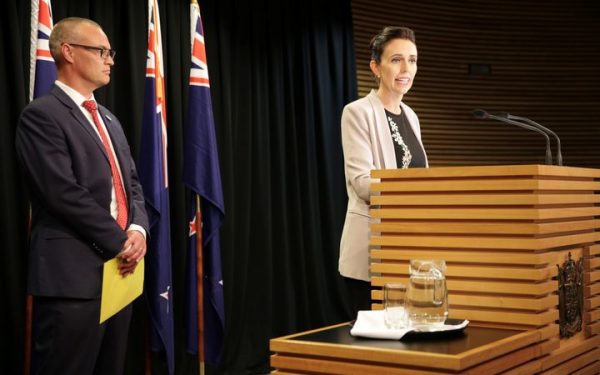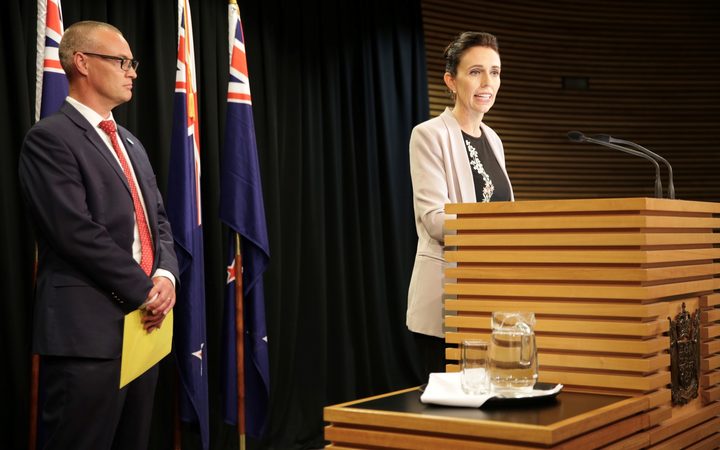
Yesterday Prime Minister Jacinda Ardern and Health Minister David Clark announced a nine-month inquiry into the country’s mental health services, something health activists, families of suicide victims and many others had been calling for, for at least three years.
The previous National Government had resisted strong public calls for an Inquiry – while watching record suicide levels climb year on year – calling proponents, among other things, “left-wing agitators’. (Unlike at the Rio Olympics, the Nats were silent when this country won the ‘Gold Medal’ for the world’s worst youth suicide figures in 2017).
The news for English, Coleman, Doocey and all the other right-wing, born-to-rule crowd is that those ‘left-wing agitators’ seem to have won the battle. A Mental Health Inquiry, the first for 22 years has been announced. Properly resourced and with terms of reference that have been well-consulted among both health sector workers and community activists like the ‘Yes, We Care’ coalition, it is expected that it will draw submissions and stories from thousands of Kiwis, and will guide mental health policy for the next generation.
One of the most telling sections in the terms of reference is the recognition that underlying causes of poor mental health and suicide, such as poverty, poor housing, unemployment and discrimination will be considered as part of the Inquiry’s work – without that, such a review could easily descend into a debate between mental health professionals over issues like best levels of medication, or how many mental health beds there should be in hospitals, rather than looking at the factors that cause mental unwellness.
My partner, Jane Stevens – speaking as spokesperson for the Yes We Care Coalition’s Bereaved Whanau Network – said “The success of the Inquiry will depend on broad participation of those affected by our mental health crisis and suicide, and [needs] sustained political pressure and momentum to ensure lasting change.”
PSA Secretary Erin Polaczuk pointed out that “Mental health [care] demand increased by more than 60% since the last Government came to power in 2008, but that funding had been for less than half of what was needed.” The PSA is also a member of Yes We Care, and has hundreds of members working in the mental health sector.
A potential down-side of the Inquiry is the panel membership, which is predominantly a collection of bureaucrats and academics well-used to the ways of government, although some, like Maori academic Mason Durie, have a good reputation for excellent strategic thinking. One member, Barbara Disley, a former Mental Health Foundation CEO and first Chair of the old Mental Health Commission actually opposed an Inquiry during the 2017 election campaign, claiming action, not investigation was what was needed – not that we’d seen any sign of action from her, or her old Foundation, during the community-led struggle for change.
While the Inquiry will take 9 months to complete, some actions have been foreshadowed already, such as trained mental health nurses and/or support workers in schools across the country – expect to see this announced as part of the new Government’s first Budget. The old Mental Health Commission will be resurrected, and the Government has made it clear part of the job of the Inquiry will be to recommend its terms of reference, noting that the National Government had disbanded the Commission in 2011.
The question to be asked in all these sorts of actions is – will they deliver, or will they just be talking shops? As my partner points out, the level of informed public participation will be the key driver in that equation.
David Macpherson is TDB’s mental health blogger. He became involved in mental health rights after the mental health system allowed his son to die. He is now a Waikato DHB Member.






Yes we need action but we also need to know exactly what is or isn’t happening after 9 years of our brighter future and the promise of better more efficient public services myth. We need to do a comprehensive review and this needs to happen in all government sectors so we can gage the extent of the problem.
Fully support the call for informed public participation, and the organising of grass roots groups, as whatever this Inquiry comes out with it will fall short of empowering people to take control of their lives from an exploiting, oppressing and alienating social system.
The definition of ‘mental health’ as a personal issue deflects blame for capitalism’s social breakdown back onto the the individual and their families, and to medicalisation and institutionalisation of what are the effects of a system in crisis.
An official Inquiry can never be independent while it is not representative of the people and controlled by ideological apparatuses of the state. A strong informed public involvement in this official Inquiry would be activated by a parallel People’s Inquiry to mobilise support for an entirely new social system.
Dave yes you are correct, “One of the most telling sections in the terms of reference is the recognition that underlying causes of poor mental health and suicide, such as poverty, poor housing, unemployment and discrimination”\\Cause & Effect of years of austerity under National have caused so many deaths and destruction, that is criminal against us all.
We hope the new government remember that they promised a new, caring, warm, inclusive, softer Government that will include the people in everything they do.
That is what publicly funded Government needs to remember is their role.
Environmental/social factors may well be important (and manipulable) contributors to mental ill-health; but it’s also true that genetics accounts for a large chunk of susceptibility to at least depression, schizophrenia, and autism. This is non-manipulable, bedrock, and should be recognized as such.
How can a group sitting around a table come up with an answer to mental health problems when “normal” has not been identified? Is “normal” behaviour unquestioning obedience to rules and regulations? Is it okay for one person to dictate to another what their “normal” should be?
Get rid of the drugs? … Big Pharma would hate that!
Who is qualified to identify “normal” and what is “normal” and where did they get the qualification?
I discovered today, from a friend that there is currently a 6month stand down period to get a “Sickness Benefit”.
This means , that if you end up losing your job because of burnout, nervous breakdown etc, you’re stuffed financially.
This would be sufficient to push a lot of people over the edge, and it’s obvious that this is what the Elite want. That people kill themselves. The more, the better.
Having Ron Paterson, former Health and Disability Commissioner, and former Ombudsman, who resigned suddenly, head the panel, this is a bad sign.
Ron Paterson has been ‘gate keeper’ for health and disability related complaints when he was Commissioner for years, and thus also blocked many complaints against providers of services succeeding.
He is a law expert, and knows how to protect the vested interest holding parties in ‘the business’ of delivering mental health services, and is likely to be more of a stumbling block or hindrance than being of assistance with this inquiry.
http://nzsocialjusticeblog2013.wordpress.com/2014/05/27/health-and-disability-commissioner-can-we-trust-in-hdc-independence/
https://nzsocialjusticeblog2013.wordpress.com/2016/03/28/how-the-hdc-throws-out-valid-complaints-and-protects-code-breaching-health-professionals-a-true-story/
https://nzsocialjusticeblog2013.wordpress.com/2015/10/04/how-the-n-z-health-and-disability-commissioner-let-off-a-biased-designated-doctor/
https://nzsocialjusticeblog2013.wordpress.com/2017/11/21/how-the-new-zealand-ombudsman-effectively-provides-cover-for-the-hdc-an-information-request-complaint-case/
https://nzsocialjusticeblog2013.files.wordpress.com/2017/11/how-the-n-z-ombudsman-effectively-provides-cover-for-the-hdc-report-post-28-11-17.pdf
Most importantly read this report:
“FEWER CHARGES ARE BEING LAID IN THE HEALTH PRACTITIONERS DISCIPLINARY TRIBUNAL: SHOULD WE BE CONCERNED?”
http://www.austlii.edu.au/au/journals/VUWLawRw/2015/49.pdf
Also read this complaint, completely thrown out by the Ombudsman, after it was presented, more to come:
https://nzsocialjusticeblog2013.files.wordpress.com/2015/08/ombudsman-complaint-abt-dr-bratt-deleting-emails-refusal-to-investigate-r-paterson-17-08-15.pdf
This government runs the risk of discrediting itself by going down the same way of other governments, using the already somewhat biased ‘experts’ in the establishment, to address the very issues the establishment and their system have caused.
With this, I am deeply worried about the usefulness and outcome of such an inquiry.
This is the only bit of hope I have in this inquiry. We are a SICK SOCIETY, to be honest, bullying, back stabbing, nasty tall poppy syndrome, mistrust, hatred and violence has a hold on too many families and individuals. I think NZ work places are toxic too, despite of all the PC bullshit we get told about how ‘well’ our employers look after staff.
Perhaps a return to normal human interaction, face to face, without all the technical distractions, the PC over reach and other madness, we can return to some form of a more healthy society.
New Zealand, the fricking truth:
https://www.youtube.com/watch?v=GMCfFRJyGfA
Comments are closed.